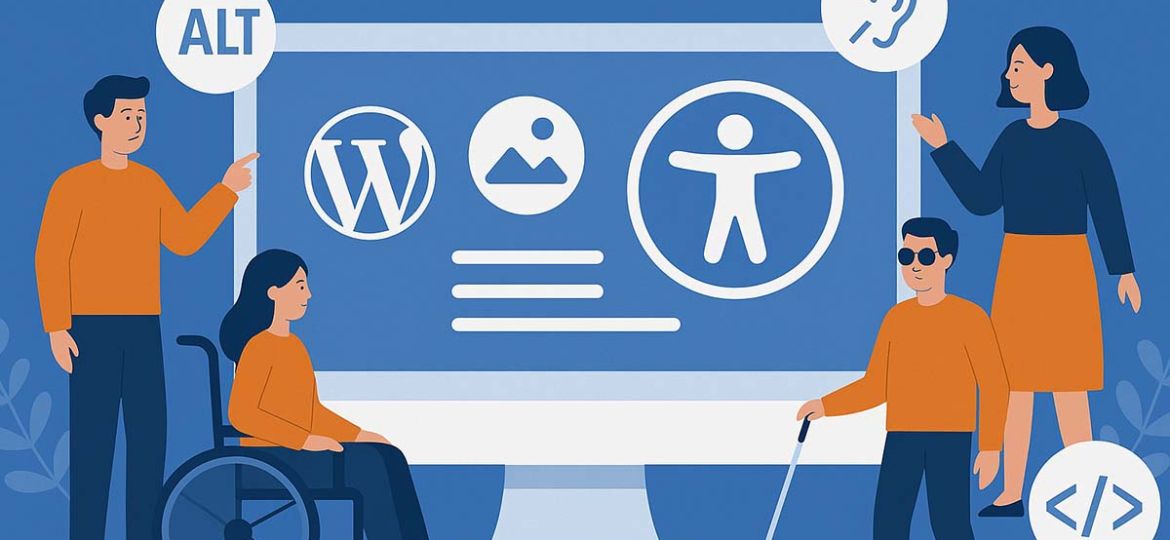
In today’s digital-first world, accessibility is no longer just a “nice-to-have”—it’s a necessity. As we move further into 2025, ensuring your WordPress website is accessible to all users, including those with disabilities, is critical from both a legal and business perspective.
At Total WP Support, we specialize in making WordPress websites compliant, inclusive, and fully optimized for all users. In this post, we’ll break down why accessibility matters in 2025, what current laws in the United States and Canada say about it, the business benefits of compliance, and why we’re the best partner to help you navigate this essential aspect of your website.
Why Accessibility Matters in 2025
According to the World Health Organization, over 1 billion people globally experience some form of disability. That’s approximately 15% of the world’s population—and that number is increasing as populations age.
In 2025, web accessibility isn’t just about ticking off checkboxes for compliance. It’s about creating an inclusive experience for all your users, regardless of ability. An accessible website ensures that users with visual, auditory, cognitive, or motor impairments can interact with your content, use your services, and engage with your brand.
More than that, accessible websites are better for everyone: they tend to load faster, rank better on search engines, and offer a smoother experience across all devices and browsers.
Understanding the Laws: The U.S. and Canada in 2025
The legal landscape for digital accessibility is evolving—and getting stricter.
🇺🇸 United States
In the U.S., web accessibility is governed by several laws:
- Americans with Disabilities Act (ADA): While the ADA was passed before the internet became mainstream, courts have increasingly ruled that websites are considered “places of public accommodation” under Title III. In 2022, the Department of Justice issued guidance reaffirming this, and in 2025, enforcement is ramping up. Public-facing business websites must meet accessibility standards or risk lawsuits.
- Section 508 of the Rehabilitation Act: Applies to federal agencies and contractors, requiring that their websites and electronic content are accessible to people with disabilities.
- Recent Trends: ADA-related lawsuits related to inaccessible websites reached record highs in 2024, and this trend continues in 2025. Small and medium-sized businesses are increasingly being targeted, especially in industries like retail, hospitality, and healthcare.
🇨🇦 Canada
Canada also has robust laws governing web accessibility:
- Accessible Canada Act (ACA): Enacted in 2019, this federal law mandates that all federally regulated organizations be accessible by 2040. As of 2025, several accessibility milestones have already passed, requiring digital content to conform to the WCAG 2.1 Level AA standard.
- AODA (Accessibility for Ontarians with Disabilities Act): In Ontario, the AODA requires all private and non-profit organizations with 50+ employees, and all public sector organizations, to make their websites and web content accessible to WCAG 2.0 Level AA.
- Provincial Requirements: Provinces like British Columbia, Manitoba, and Nova Scotia are implementing their own accessibility legislation, and more are expected to follow.
Failing to comply with these laws can result in fines, lawsuits, and damage to your brand—but it’s not just about avoiding penalties. Accessible websites are simply better websites.

The Benefits of Website Accessibility for Business Owners
While accessibility may seem like a technical or legal checkbox, it actually provides a wide range of benefits for website owners:
1. Reach a Larger Audience
An accessible website allows you to connect with people who have disabilities—an underserved but significant market. Whether it’s people who use screen readers or have limited mobility, your site becomes usable by everyone.
2. Improve SEO Performance
Search engines love accessible websites. Structured content, alt text, meaningful navigation, and semantic HTML not only help assistive technologies but also boost your Google rankings.
3. Enhance Usability for All Visitors
Accessibility features—like clear text, good color contrast, and keyboard navigation—benefit all users, not just those with disabilities. An accessible site is easier to navigate, read, and use.
4. Build Brand Loyalty
Showing that you care about all your users builds trust and credibility. Accessibility is a reflection of your brand’s values—and users notice.
5. Reduce Legal Risk
Complying with accessibility standards drastically reduces the risk of facing an accessibility lawsuit, which can cost thousands (or more) in legal fees and settlements.
What Does an Accessible WordPress Website Look Like in 2025?
In 2025, the gold standard for accessibility is still the Web Content Accessibility Guidelines (WCAG)—specifically WCAG 2.2, which was finalized in late 2023. At a minimum, most businesses should aim for Level AA compliance.
Here’s what that includes:
- Text Alternatives: Alt text for images and meaningful labels for all non-text content.
- Keyboard Navigation: Full usability without a mouse.
- Readable Content: Clear headings, logical structure, and understandable language.
- Color Contrast: Adequate contrast between text and background.
- Responsive Design: Easy to use across mobile, tablet, and desktop devices.
- Error Identification: Forms and interactive elements that provide useful feedback and instructions.
Accessibility also extends beyond just the code—videos need captions, PDFs must be readable by screen readers, and third-party plugins or tools must be accessible too.

How Total WP Support Helps You Stay Compliant
At Total WP Support, we’ve built our reputation as one of the best WordPress support companies in the world by making WordPress sites bulletproof—from website performance and WordPress security to accessibility and compliance. Here’s why we’re your best partner for achieving and maintaining website accessibility in 2025:
WordPress Expertise
We live and breathe WordPress. Our team understands the nuances of building and retrofitting accessibility into WordPress themes, plugins, and page builders (like Elementor, Divi, and Gutenberg).
Accessibility Audits & Reports
We offer full accessibility audits based on WCAG 2.2 standards. Our detailed reports highlight issues, explain why they matter, and offer practical fixes—whether it’s an unlabeled button or poor keyboard navigation.
Accessible Design & Development
Need a new website or a redesign? We build every site with accessibility in mind from day one. That includes semantic HTML, compliant colors, keyboard-friendly interactions, and assistive-technology compatibility.
Plugin Recommendations & Fixes
Many WordPress plugins can break accessibility. We help you choose the right tools—or modify existing ones—so that your site remains functional and compliant.
Ongoing Support & Maintenance
Accessibility isn’t a “set it and forget it” task. As new content is added and technology evolves, our ongoing support packages ensure your site stays compliant—and your team stays informed.
Affordable Solutions for Businesses of All Sizes
We believe accessibility should be achievable for every business, not just big corporations. Our packages are tailored to small and medium-sized businesses that want premium support at a manageable price.
Ready to Make Your WordPress Site Accessible in 2025?
Accessibility is more than a legal obligation—it’s an opportunity to serve your customers better, grow your reach, and future-proof your brand.
At Total WP Support, we make accessibility simple, effective, and affordable. Whether you’re building a new site or bringing an existing one up to standard, our WordPress experts are ready to help.
Let’s make the web a better place—together.
📞 Contact us today for a free consultation and accessibility readiness check.
Total WP Support: High-Quality WordPress Support. Reliable. Responsive. Ready to Help.

